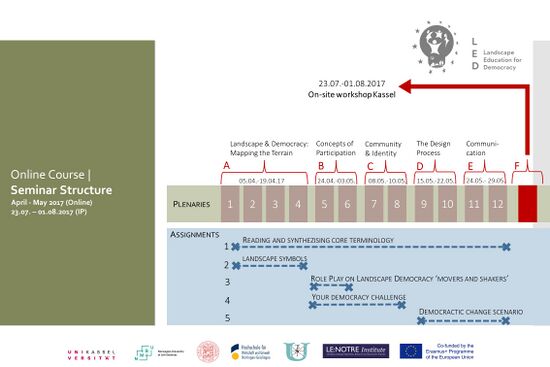Seminar Landscape Education for Democracy 2017: Difference between revisions
No edit summary |
No edit summary |
||
| Line 12: | Line 12: | ||
The idea behind the LED (Landscape Education for Democracy) project, a partnership between 5 European landscape architecture faculties and the LE:NOTRE Institute is to promote awareness and empower young design and planning professionals to become more active in shaping democratic change. The project employs interdisciplinary, problem-based learning environments and curricular innovation to introduce landscape and democracy as a cross-disciplinary subject. Our goal is to fill a gap in design and planning education and give students the opportunity to confront themselves with pressing issues of landscape democracy, right to the landscape and participation. | The idea behind the LED (Landscape Education for Democracy) project, a partnership between 5 European landscape architecture faculties and the LE:NOTRE Institute is to promote awareness and empower young design and planning professionals to become more active in shaping democratic change. The project employs interdisciplinary, problem-based learning environments and curricular innovation to introduce landscape and democracy as a cross-disciplinary subject. Our goal is to fill a gap in design and planning education and give students the opportunity to confront themselves with pressing issues of landscape democracy, right to the landscape and participation. | ||
The LED course | The 2017 LED course started in March featuring 13 online course sessions available to students at any institution, as well as a 10-days on-site intensive programme organised by Kassel University in Germany. | ||
Please download the '''[https://ilias.hfwu.de/goto.php?target=file_16866_download&client_id=hfwu LED 2017 Presentation]''' for further information. | Please download the '''[https://ilias.hfwu.de/goto.php?target=file_16866_download&client_id=hfwu LED 2017 Presentation]''' for further information. | ||
| Line 24: | Line 20: | ||
'''Online seminar: March-May''' | '''Online seminar: March-May''' | ||
* [[LED Seminar Schedule 2017|LED_Online_Seminar_Schedule_2017]] | |||
*The online module | *The online module consisted of thirteen 90-minute sessions of lectures, reading materials, collaborative group work, concept mapping, storyboarding and other diverse active and passive learning tools. | ||
*The course has met on '''Mondays''' and '''Wednesdays''' between '''15 30''' and '''17 00''' pm CET in the LED virtual classroom. | |||
'''Themes covered in the course | '''Themes covered in the course were:''' | ||
*Landscape and democracy | *Landscape and democracy | ||
*Participation theories and practices | *Participation theories and practices | ||
Revision as of 07:15, 2 November 2017
{{#evu:https://www.youtube.com/watch?v=U1FlOjd1bG8&feature=youtu.be |alignment=right |description=Video documentation of the LED online seminar and intensive study programme 2016 }} This page documents the fist LED online seminar which was organised from March - June, 2017 by the LED partners
Introduction
The landscape belongs to everyone. We should all have equal access to it and a voice in how it is used, valued and maintained. However, spatial planning education rarely includes considerations of democratic processes, participatory planning, community design and landscape stewardship. Furthermore, it does not fully prepare young practcioners to become leaders in promoting democratic landscape change and work effectively in partnership with communities.
The idea behind the LED (Landscape Education for Democracy) project, a partnership between 5 European landscape architecture faculties and the LE:NOTRE Institute is to promote awareness and empower young design and planning professionals to become more active in shaping democratic change. The project employs interdisciplinary, problem-based learning environments and curricular innovation to introduce landscape and democracy as a cross-disciplinary subject. Our goal is to fill a gap in design and planning education and give students the opportunity to confront themselves with pressing issues of landscape democracy, right to the landscape and participation.
The 2017 LED course started in March featuring 13 online course sessions available to students at any institution, as well as a 10-days on-site intensive programme organised by Kassel University in Germany.
Please download the LED 2017 Presentation for further information.
Course schedule and content for 2017
Online seminar: March-May
- The online module consisted of thirteen 90-minute sessions of lectures, reading materials, collaborative group work, concept mapping, storyboarding and other diverse active and passive learning tools.
- The course has met on Mondays and Wednesdays between 15 30 and 17 00 pm CET in the LED virtual classroom.
Themes covered in the course were:
- Landscape and democracy
- Participation theories and practices
- Community and identity
- The design process
- Communication and representation
Registration
- The registration deadline is 26th of March 2017, for both the online course and the intensive programme
- Registered participants will receive regular information by email and invitations to the online seminar sessions
- Registration for the online course and application for participation in the intensive study programme are done via the same link:
Conditions for participation and credits
Participation in the online seminar is free and open to students at any institution as well as the general public.
There are no registration fees. Participation is possible in active or passive mode.
- Active participation includes:
- regular attendance of the online class (or working with the seminar recordings in due time)
- completion of the seminar coursework and group assignments
- academic recognition of up to 5 ECTS
- Passive participation includes:
- visitation of online seminar sessions either in real time or through video recordings;
- no academic recognition granted
Further information
- please contact info(at)led-project.org
Our partnership
Grant holder and coordinator
- NMBU, Norwegian University of Life Sciences, Department of Landscape Architecture and Spatial Planning
Project partners
- Nürtingen-Geislingen University, Nürtingen, Germany
- University of Kassel School of Architecture, Urban and Landscape Planning, Kassel, Germany
- Szent István University, Faculty of Landscape Architecture, Budapest, Hungary
- University of Bologna, Department of Architecture, Italy
- LE:NOTRE Institute, an international foundation based in Wageningen, Netherlands.
ERASMUS+ Strategic Partnership Programme

